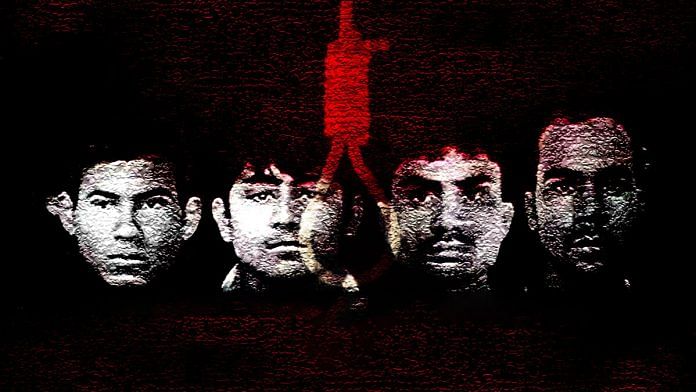New Delhi: A Delhi court Friday issued fresh death warrants against the four convicts in the 16 December gang rape and murder case, ordering their execution at 6 am on 1 February.
The court of Additional Sessions Judge Satish Arora issued the fresh warrants hours after President Ram Nath Kovind reportedly rejected a mercy petition filed by one of the convicts, Mukesh Singh.
However, confusion persisted during the hearing as counsel for Singh, Vrinda Grover insisted on an official communication of the rejection and not “rely on media reports”. The court was hearing Singh’s petition seeking a delay in the execution.
Public prosecutor Irfan Ahmed finally presented the official communication from the President’s office. Earlier on Thursday, the court was informed that a convict whose mercy plea is rejected is given a 14-day period before being executed.
In a separate hearing in the Delhi High Court last week, the government said the execution could not take place on 22 January since Singh’s mercy petition was pending at the time.
On hearing the arguments, Judge Satish Arora observed that the convicts were trying delay tactics.
“This case presents a scenario when convicts were given the opportunity to file mercy but only one preferred. There might be delay tactics. For how long will this go on?” Judge Arora asked.
Also read: How 16 December gang-rape convicts are using the law to avoid execution
AP Singh, who represents the other three convicts Pawan Gupta, Vinay Sharma and Akshay Thakur, told the court that he is waiting on certain case details from Tihar Jail. Grover also submitted an application in court Friday stating she needed certain documents to challenge the rejection of the mercy plea.
Last month, the Supreme Court dismissed the last review petition filed by Akshay Thakur.
The four men were convicted for the gang rape and murder of a 23-year-old paramedic student, referred to as Nirbhaya, on the intervening night of 16-17 December 2012 inside a moving bus in south Delhi. She died on 29 December 2012 at Mount Elizabeth Hospital in Singapore.
Six people were arrested for the crime, of which Ram Singh, the prime accused, was found hanging in his cell. Another was 17 years old at the time and convicted under the Juvenile Justice Act (JJA). He has since served three years in a reform home, the maximum sentence under JJA. On his release, he was rehabilitated and is believed to be working as a cook in southern India under a new identity.
(With inputs from PTI)
Also read: Gym instructor, fruitseller, bus driver — the 6 men convicted in Nirbhaya gangrape-murder




One thing we can be sure of: the convicts will not hang on February 1. The entire system, over the last 70 years, has been destroyed. The Supreme Court has given itself the authority to rule on the mercy petition as well! So even if the mercy petition is rejected, the convicts can and will go to the courts again. Even the curative appeal is itself a law created by our self appointed judiciary. What people don’t realize is that these byzantine rules were deliberately created over the last 50 years by the courts themselves and aren’t based on any laws. It was an open secret that the courts wanted to outlaw the death penalty but were afraid of the public opinion. The courts in India has become a law into themselves with rulings based on judicial biases with one ear cocked to the public opinion. Sadly the death penalty laws and procedures is just a window in the destruction of our legal system that prevents governance and progress in every field.